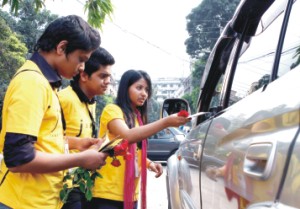| Home - Back Issues - The Team - Contact Us |
 |
| Volume 10 |Issue 20 | May 27, 2011 | |
|
|
Education Oh, the Places You'll Go! Shahana Siddiqui
Today I will share a little bit of my personal tale because at times, it is the personal stories that make any sense at all. Like any other day, I just dropped off my son Sofian to his pre-school/day care, Pixieland. What was different today is that they were taking pre-graduation pictures with the “big kids” in their cap and gown. Sofian who is now over three years old, is one of the big kids who will be graduating from Pixieland this May 17th. I joked with the founder and principal of the school, Maliha Kuddus that I will be the one crying my heart out at Sofian's graduation because it is me who will miss the school the most. Little did I know that the crying process would start in the car! When Sofian first started his days at Pixieland, my decision to put a 14 month old child to a day care center/pre-school came with much criticism and you-are-not-so-great-mother- heavily loaded comments. “Atoh chhoto baccha'ke school'e? Arektu pore dita”. Mind you, no one knew what was going on in my life at that time – what or why the pre-school would be convenient, but when it came to giving free advice, us Bangalis seem to be champions at it! Truth is, when Sofian started school, a series of personal turmoil were taking place in both of our lives. Sofian, as young as he was, knew things were not quite right. Mrs. Kuddus, a teacher and care-provider for the last 30 years, did not need to hear the details. She knew exactly the situation I was in and instructed her teachers accordingly on how to approach the child. Two and a half years later, the shy little toddler who entered Pixieland, who would hardly play with the other children, walks in everyday through the school gates, confident, happy, knowing he is one of the “elders” in the pack! I sometimes take a few minutes before rushing off to office to speak to the teachers and Mrs. Kuddus on how things are going and just watch the little ones play around, do their art work or sing on top of their little voices! It fills my heart with such joy to see children this happy. Many will say, for what was paid for Sofian's education, of course he will get that care from that school. Not necessarily. Money these days can't buy me love or decent child care! High tuition is a means to hold teachers and schools accountable, but does not necessarily guarantee love, warmth and child friendly behavior. Let's jump to another part of town, to a different kind of school called JAAGO in Rayar Bazaar to further explain what I am trying to say about money, love, education. Just recently, for a field visit, I went around the JAAGO Foundation's school premises right at the edge of the Rayar Bazaar slum area. Korvi Rakshand, the founder, a young chap, had a simple idea – why not give slum children English education through volunteers/teachers who were educated in that system? And so it started – a school that started with 17 children on a carpet, is now a happy, healthy environment for over 200 children. The school building is developing bit by bit, nothing grand, but very colorful and just downright happy!
In my not-so-short-no-so-long career, I have visited several schools run by several different NGOs for several different target groups in several different locations in Dhaka and Bangladesh in general. Very few impressed me as much as JAAGO's school (few of the BRAC schools in the rural areas were fantastic!). I saw a stark difference between the children of non-formal education schools of NGOs and the yellow emblem uniformed JAAGO children in their approach. I was greeted with “how are you” and “what is your name” instead of the usual 10 minutes of initial awkwardness and shyness children I work with in the other drop in centers and schools. The school is functioning completely on sponsorships and other donations and a lot of love and dedication on the part of the volunteers and teachers. What is different about this school for the underprivileged and the others is that at JAAGO, the children are not target groups, they are students. Any child, therefore, can in fact get a decent, quality education with care. Education that will not only teach the ABCs and algebra but also inspire them to grow up to be the person they want to be, they are destined to be. There is a professor and researcher at Duke University, Anirudh Krishna, who recently wrote a book on how people are not necessarily born into poverty but how they become poor in their lifespan. During his lecture at BRAC a couple of years ago, he mentioned how his research also looked into all the unrecognised talents in children simply because they are born or raised poor. Children of poor families are targets to be achieved, given practical trainings so that they can exist, survive, not live, dream. And that is the realm of private/non-profit schools. How public schools are functioning remains a real enigma to us all! When we ask about the deteriorating school buildings, we are told about the insufficient education budget. When we ask about why the corporal punishments in schools, we are told with such low salaries for the Government teachers, why would you expect them to behave better? When we ask why not look into the options of privatizing education if it is too much for the Government – we are immediately criticised for encouraging foreign, elite education. If budget is such a constraint, how does a Least Developed Country allocate BDT 9,175 crore on its defense sector for 2010-2011 fiscal year in comparison to BDT 8,062 crore on primary and mass education? (The total education budget is more than 18,000 crore but large amounts allocated to Education Division and ICT). As for low salaries leading to low manners and humanity – arguments like that imply that poor people or people with low-income groups are innately rude and violent people. It is the same racist and classist deductions made towards African Americans and Latinos in U.S., gypsies in Europe, Muslims in India and so forth. To be quite honest, I am too scared to even bring up the topic of private-public partnerships in education. While I know extremely well the problems of English private education in Bangladesh, I am also weary to open that Pandora's box for the fear of inviting an army of Government officials who will immediately push for more state control over all private schools. Because it seems any talk of private sector regulation and/or PPP, immediately signals state ownership! So what is the point of this article? The point is that there is a general lack of love and care in our education no matter what the system, how much the tuition. This is about how it does not take a huge amount of budget or highly trained teachers to be decent and respectful towards students. This is about how every child deserves to be treated like humans and not an object of income generation or an achievable target. It does not cost anyone to smile a little, to laugh a little, to care a little for our young ones. Many of our parents were educated in small mofassil schools during their times when school teachers had limited income without the option of earning through private coaching. Yet they commanded respect wherever they went and remembered fondly by their aging former students. So excuse me while I refuse to believe that low salary is the reason for teachers to neglect, abuse, disrespect children. Excuse me while I still believe (and perhaps quite naively) that we as a nation can still be humane and caring towards at least our young ones.
Copyright (R) thedailystar.net 2011 |

